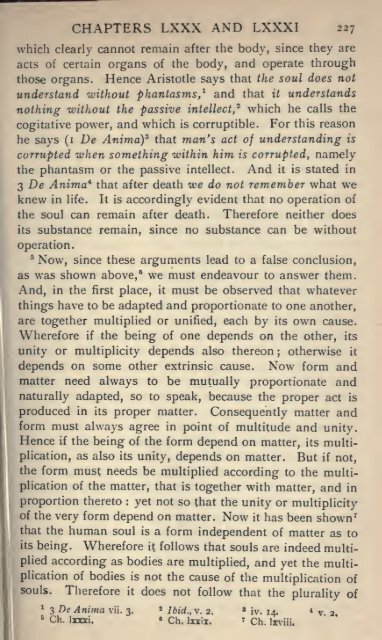summa-contra-gentiles
Summa
Summa
Create successful ePaper yourself
Turn your PDF publications into a flip-book with our unique Google optimized e-Paper software.
CHAPTERS LXXX AND LXXXI 227<br />
which clearly cannot remain after the body, since they are<br />
acts of certain organs of the body, and operate through<br />
those organs. Hence Aristotle says that the soul does not<br />
understand ivithout phantasms,^ and that it understands<br />
nothing ivithout the passive intellect,' which he calls the<br />
cogitative power, and which is corruptible. For this reason<br />
he says (i<br />
De AnimaY that man's act of understanding is<br />
corrupted when something within him is corrupted, namely<br />
the phantasm or the passive intellect. And it is stated in<br />
3 De Anima* that after death we do not remember what we<br />
knew in life. It is<br />
accordingly evident that no operation of<br />
the soul can remain after death. Therefore neither does<br />
its substance remain, since no substance can be without<br />
operation.<br />
^<br />
Now, since these arguments lead to a false conclusion,<br />
as was shown above,* we must endeavour to answer them.<br />
And, in the first it<br />
place, must be observed that whatever<br />
things have to be adapted and proportionate to one another,<br />
are together multiplied or unified, each by<br />
its own cause.<br />
Wherefore if the being of one depends on the other, its<br />
unity or multiplicity depends also thereon ;<br />
otherwise it<br />
depends on some other extrinsic cause. Now form and<br />
matter need always to be mutually proportionate and<br />
naturally adapted, so to speak, because the proper act is<br />
produced in its proper matter. Consequently matter and<br />
form must always agree in point of multitude and unity.<br />
Hence if the being of the form depend on matter, its multiplication,<br />
as also its unity, depends on matter. But if not,<br />
the form must needs be multiplied according to the multiplication<br />
of the matter, that is together with matter, and in<br />
proportion thereto :<br />
yet not so that the unity or multiplicity<br />
of the very form depend on matter. Now it has been shown^<br />
that the human soul is a form independent of matter as to<br />
its being. Wherefore it follows that souls are indeed multiplied<br />
according as bodies are multiplied, and yet the multiplication<br />
of bodies is not the cause of the multiplication of<br />
souls. Therefore it does not follow that the plurality of<br />
^ 3 De Anima vii. 3.<br />
* Ibid., v. 2.<br />
' iv. 14. * v 2<br />
'<br />
Ch. Ixxxi. • Ch. Ixxii. '<br />
Ch. Ix\-iii.


















